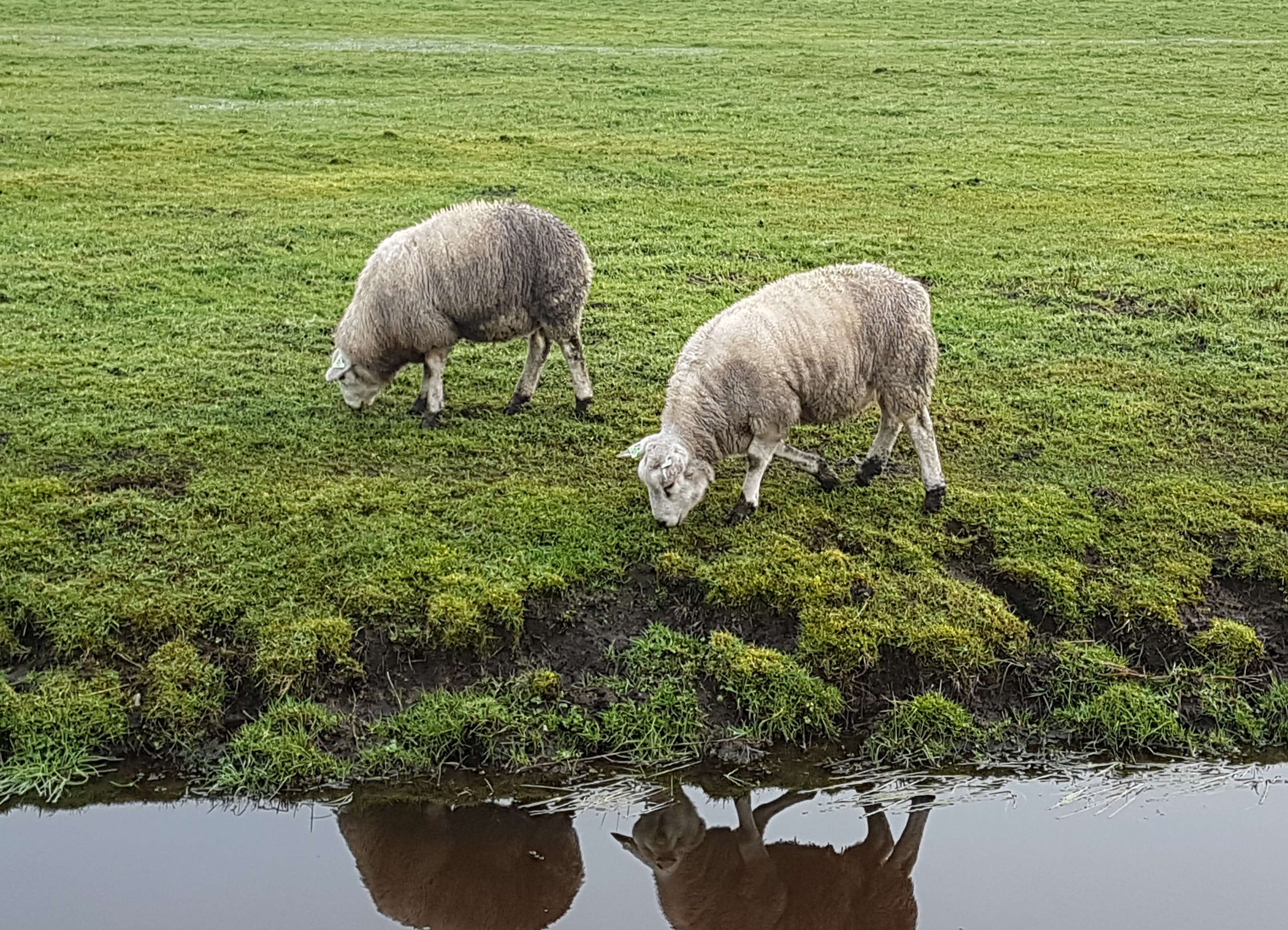WEST GERMANIC
The singular form of sheep
Linguistics
| 31-01-2020
The singular form of 'sheep' - that doesn't sound strange in English, nor does it in Frisian when you say it inkelfâld fan 'skiep'. But in Dutch, het enkelvoud van schaap does sound puzzling, and German speakers will also frown when you talk about 'Schaf' in der Einzahl. What's going on here?
North Sea vs. Elbe-Weser-Rhine
Eén schaap, twee schapen. Ein Schaf, zwei Schafe. Dutch and German (both originating from what you might call Elbe-Weser-Rhine-Germanic) have a clear difference between singular and plural, where these woolly quadrupeds are concerned. In Frisian and English (both North Sea Germanic), however, you need the sentence or a numeral to be able to determine how many of these animals are involved: ien skiep, twa skiep; one sheep, two sheep. If you put it one behind the other like this, there is another difference between the two West Germanic camps: the Dutch and German word have an [a]-sound, while Frisian and English have a long [i]-sound. (The 'ie' in skiep is prononouced as what phonetically would be written as [iə].) If the word 'sheep' has an Indo-European origin, there must have been a sound change somewhere. This not only applies to the vowels, but also to the Sch- ([ʃ]), sch- ([sχ]), sk- en sh- ([ʃ]), although the division into 'camps' is different there.

Surprising sound change
And then it says in the EWN "< pgm. *skēpa- ‘schaap’". That is linguistic language for: in Protogerman, the (re)constructed origin of all Germanic languages, the word skēpa was probably used for 'sheep'. The asterisk (*) indicates that it is a (re)constructed form. So there is no written source in which the word appears, and due to the lack of such evidence it's not entirely certain that the word looked like this. But it is plausible, based on linguistic research. If you look at where the sounds of the vowels are formed in your mouth, the [e] is closer to the [i] than to the [a]. It then seems as if the sound has changed more strongly in Dutch and German than in Frisian and English. However, that appears not to be the case.
Because I got a bit confused by all the sounds and the different spellings for it (the 'ē' etymologists use probably comes closest to the sound that is phonically written as [e] or [e:]), I have asked Henk Wolf for help. If I understand him correctly, in short it comes down to the following. The [e]-sound in skēpa first developed into an [a]-sound, which has remained the same in Standard Dutch and Standard German, although the precise pronunciation of that [a] differs slightly from region to region. In the joint ancestor of Frisian and English, that sound was probably changed before the Middle Ages into a vowel that resembles the [æ:] in English scared, possibly with the [ɛ:] as in the Frisian bêst as an intermediate step. In the late Middle Ages, it became a long [e]-sound in the Old Frisian ([e:]), which means they had roughly returned to the sound in skēpa. After that the sound was further developed into the [iə] in skiep. In Old English people knew sceap and scep, according to etymonline.com, which seems to come close to the [æ:] or [ɛ:] in terms of sound. So it seems that the sound change took a bit more time in English than in Frisian, but as we all know, the English language eventually also ended up with a kind of long [i]-sound in sheep.
Counting sheep
If I immersed myself in it, I could now tell a big linguistic history about the other sound changes that apply here, but I won't. Or at least now I won't. At the moment, I mainly wonder about the singular-plural story. Why don't the Frisians just say ien skiep, twa skiepen? And what prevents English speakers from talking of two sheeps? To answer that question, I turn to etymonline again: "The plural form was leveled with the singular in Old English." So in English, the singular and plural of the word for sheep had already been levelled before the entire vowel shift from the previous paragraph was a fact. Etymonline does not provide more information. Fortunately there are more sources. The Basisboek Historische taalkunde ('Basic Book of Historical Linguistics') contains a subsection on the formation of plurals in Middle Dutch. In it I read that neuter nouns with a long syllable (that is, among other things, a syllable with a long vowel, followed by one or two consonants) had a plural form that was equal to the singular. Two examples are given: dat dinc - die dinc and dat woort - die woort. Since Old Frisian and Middle Dutch were closely related languages in many respects, the same could apply to skiep. In the two examples from Middle Dutch you can see from the article (dat or die) whether it is singular or plural. This also applies to contemporary Frisian: it skiep for the singular and de skiep for the plural. In English, however, it is the sheep in both cases. There you need the sentence and/or a numeral to see how many sheep are involved. That way you can still count sheep in English.
North Sea vs. Elbe-Weser-Rhine
Eén schaap, twee schapen. Ein Schaf, zwei Schafe. Dutch and German (both originating from what you might call Elbe-Weser-Rhine-Germanic) have a clear difference between singular and plural, where these woolly quadrupeds are concerned. In Frisian and English (both North Sea Germanic), however, you need the sentence or a numeral to be able to determine how many of these animals are involved: ien skiep, twa skiep; one sheep, two sheep. If you put it one behind the other like this, there is another difference between the two West Germanic camps: the Dutch and German word have an [a]-sound, while Frisian and English have a long [i]-sound. (The 'ie' in skiep is prononouced as what phonetically would be written as [iə].) If the word 'sheep' has an Indo-European origin, there must have been a sound change somewhere. This not only applies to the vowels, but also to the Sch- ([ʃ]), sch- ([sχ]), sk- en sh- ([ʃ]), although the division into 'camps' is different there.

Schafe / schapen / skiep / sheep
Sound differences The EWN teaches me – and you, if you read on – that the word the aforementioned languages use for the "ruminant of the genus Ovis", only occurs in West Germanic languages. The word used for that animal in most Indo-European languages can be recognized in Dutch ooi and, I think, in English ewe. So there is no Indo-European stem for sheep in which the 'original' vowel can be seen. However, the EWN does tell what were probably the old forms of sheep in different languages. You can read 'ā' as [a] and 'ē' as [e]. Here also there is a clear dichotomy:| Elbe-Weser-Rhine-Germanic | North Sea Germanic |
|---|---|
| Old Dutch: skāp | Old Frisian: skēp |
| Old Saxon: scāp | Old English: scēp | Old High German: scāf |
Surprising sound change
And then it says in the EWN "< pgm. *skēpa- ‘schaap’". That is linguistic language for: in Protogerman, the (re)constructed origin of all Germanic languages, the word skēpa was probably used for 'sheep'. The asterisk (*) indicates that it is a (re)constructed form. So there is no written source in which the word appears, and due to the lack of such evidence it's not entirely certain that the word looked like this. But it is plausible, based on linguistic research. If you look at where the sounds of the vowels are formed in your mouth, the [e] is closer to the [i] than to the [a]. It then seems as if the sound has changed more strongly in Dutch and German than in Frisian and English. However, that appears not to be the case.
Because I got a bit confused by all the sounds and the different spellings for it (the 'ē' etymologists use probably comes closest to the sound that is phonically written as [e] or [e:]), I have asked Henk Wolf for help. If I understand him correctly, in short it comes down to the following. The [e]-sound in skēpa first developed into an [a]-sound, which has remained the same in Standard Dutch and Standard German, although the precise pronunciation of that [a] differs slightly from region to region. In the joint ancestor of Frisian and English, that sound was probably changed before the Middle Ages into a vowel that resembles the [æ:] in English scared, possibly with the [ɛ:] as in the Frisian bêst as an intermediate step. In the late Middle Ages, it became a long [e]-sound in the Old Frisian ([e:]), which means they had roughly returned to the sound in skēpa. After that the sound was further developed into the [iə] in skiep. In Old English people knew sceap and scep, according to etymonline.com, which seems to come close to the [æ:] or [ɛ:] in terms of sound. So it seems that the sound change took a bit more time in English than in Frisian, but as we all know, the English language eventually also ended up with a kind of long [i]-sound in sheep.
Counting sheep
If I immersed myself in it, I could now tell a big linguistic history about the other sound changes that apply here, but I won't. Or at least now I won't. At the moment, I mainly wonder about the singular-plural story. Why don't the Frisians just say ien skiep, twa skiepen? And what prevents English speakers from talking of two sheeps? To answer that question, I turn to etymonline again: "The plural form was leveled with the singular in Old English." So in English, the singular and plural of the word for sheep had already been levelled before the entire vowel shift from the previous paragraph was a fact. Etymonline does not provide more information. Fortunately there are more sources. The Basisboek Historische taalkunde ('Basic Book of Historical Linguistics') contains a subsection on the formation of plurals in Middle Dutch. In it I read that neuter nouns with a long syllable (that is, among other things, a syllable with a long vowel, followed by one or two consonants) had a plural form that was equal to the singular. Two examples are given: dat dinc - die dinc and dat woort - die woort. Since Old Frisian and Middle Dutch were closely related languages in many respects, the same could apply to skiep. In the two examples from Middle Dutch you can see from the article (dat or die) whether it is singular or plural. This also applies to contemporary Frisian: it skiep for the singular and de skiep for the plural. In English, however, it is the sheep in both cases. There you need the sentence and/or a numeral to see how many sheep are involved. That way you can still count sheep in English.
WEST GERMANIC
In the West Germanic section every other week I discuss a word that strikes me. I look at the meanings and forms of the word, and especially at where the word originates from. With that I compare the four West Germanic languages Dutch, English, Frisian and German, with the occasional inevitable trip across the fictional West Germanic border.
In the next episode: Slaap, kindje, slaap...
Sources
Most sources are indicated in the text as a link. For German I used the 'Van Dale Study Dictionary' (first edition, 2006).
Image: own photo.
